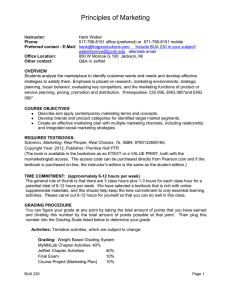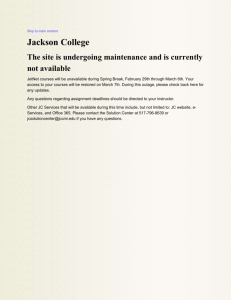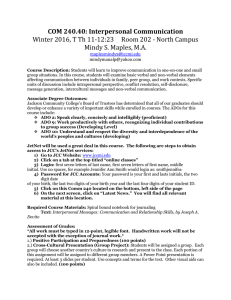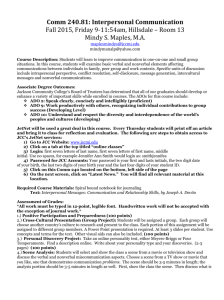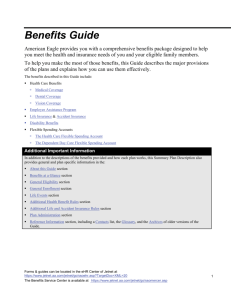speech 231 - Jackson College
advertisement
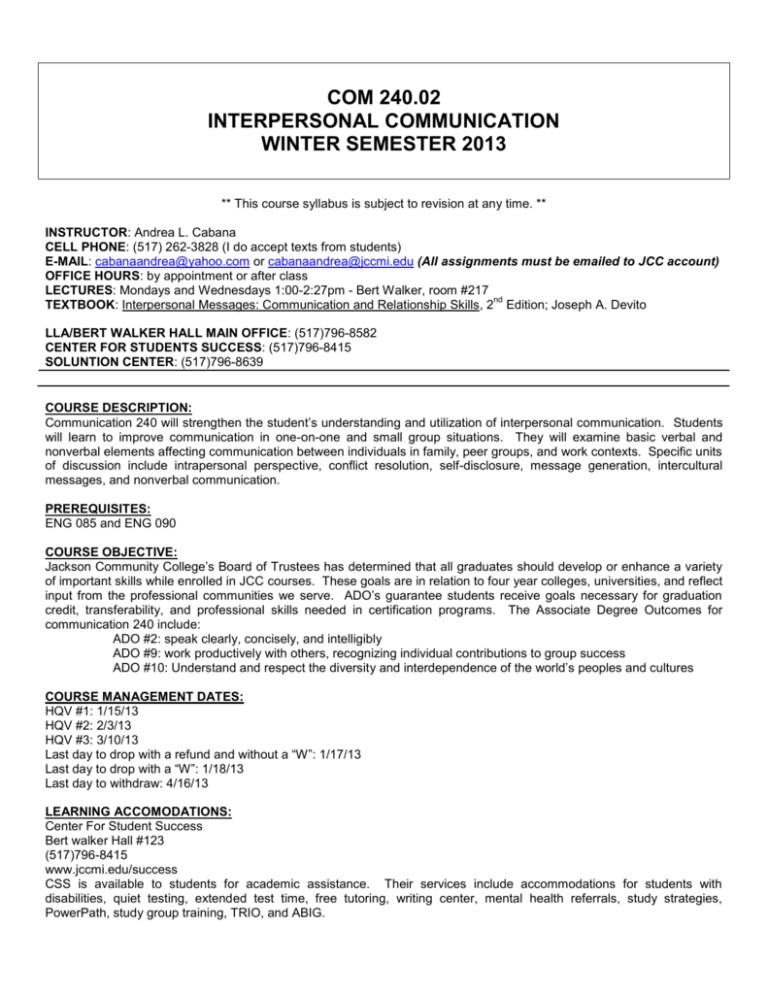
COM 240.02 INTERPERSONAL COMMUNICATION WINTER SEMESTER 2013 ** This course syllabus is subject to revision at any time. ** INSTRUCTOR: Andrea L. Cabana CELL PHONE: (517) 262-3828 (I do accept texts from students) E-MAIL: cabanaandrea@yahoo.com or cabanaandrea@jccmi.edu (All assignments must be emailed to JCC account) OFFICE HOURS: by appointment or after class LECTURES: Mondays and Wednesdays 1:00-2:27pm - Bert Walker, room #217 nd TEXTBOOK: Interpersonal Messages: Communication and Relationship Skills, 2 Edition; Joseph A. Devito LLA/BERT WALKER HALL MAIN OFFICE: (517)796-8582 CENTER FOR STUDENTS SUCCESS: (517)796-8415 SOLUNTION CENTER: (517)796-8639 COURSE DESCRIPTION: Communication 240 will strengthen the student’s understanding and utilization of interpersonal communication. Students will learn to improve communication in one-on-one and small group situations. They will examine basic verbal and nonverbal elements affecting communication between individuals in family, peer groups, and work contexts. Specific units of discussion include intrapersonal perspective, conflict resolution, self-disclosure, message generation, intercultural messages, and nonverbal communication. PREREQUISITES: ENG 085 and ENG 090 COURSE OBJECTIVE: Jackson Community College’s Board of Trustees has determined that all graduates should develop or enhance a variety of important skills while enrolled in JCC courses. These goals are in relation to four year colleges, universities, and reflect input from the professional communities we serve. ADO’s guarantee students receive goals necessary for graduation credit, transferability, and professional skills needed in certification programs. The Associate Degree Outcomes for communication 240 include: ADO #2: speak clearly, concisely, and intelligibly ADO #9: work productively with others, recognizing individual contributions to group success ADO #10: Understand and respect the diversity and interdependence of the world’s peoples and cultures COURSE MANAGEMENT DATES: HQV #1: 1/15/13 HQV #2: 2/3/13 HQV #3: 3/10/13 Last day to drop with a refund and without a “W”: 1/17/13 Last day to drop with a “W”: 1/18/13 Last day to withdraw: 4/16/13 LEARNING ACCOMODATIONS: Center For Student Success Bert walker Hall #123 (517)796-8415 www.jccmi.edu/success CSS is available to students for academic assistance. Their services include accommodations for students with disabilities, quiet testing, extended test time, free tutoring, writing center, mental health referrals, study strategies, PowerPath, study group training, TRIO, and ABIG. STUDENT WITH DISABILITIES: Students with disabilities who believe that they may need accommodations in this class are encouraged to speak to me and contact the Center For Student Success as soon as possible to ensure that accommodations are implemented in a timely fashion. JETNET: It is required that you are able to access and use the electronic component of JCC courses, JetNet. It will be the primary means of communication outside of the classroom. All Course documents, assignments, and grades will be posted weekly. Students will not receive paper copies of anything other than the original syllabi. ACADEMIC HONESTY POLICY: Academic honesty is expected of all students. It is the ethical behavior that includes producing their own work and not representing others’ work as their own, either by plagiarism, by cheating, or by helping others to do so. Students suspected of academic dishonesty will be penalized by taking appropriate action, including assigning a failing grade for the paper, project, speech, exam, or the course itself. Academic dishonesty will be documented by the instructor in writing and sent to the Dean of Faculty. CLASSROOM BEHAVIOR: 1. Although it is not necessary that we agree with everyone’s opinion, it is expected that all ideas, thoughts, and comments will be treated with a high level of respect. 2. There will be plenty of time for group discussion, however when individuals (students and instructor) are speaking all attention is directed towards them. 3. It is inappropriate to use obscene language or jesters, tell offensive jokes, or allude to sexual references that may be demeaning or offensive. Please be mindful of what you say and how you say it. This will be integral in order for us to discuss and dialogue about issues that may be sensitive to others in the classroom. 4. In an effort not to disrupt the class, please make sure that all cell phones are off or on vibrate. LAPTOPS: Using a laptop during class for any purpose other than the subject at hand is unacceptable. Failure to comply with this request will result in a complete loss of daily participation points and possibly dismissal from class. GRADE APPEALS: If a student chooses to appeal a grade he/she must make the grade appeal in writing within one week of the grade being returned. Prepare and submit a typed argument indicating what the specific appeal is and what grade is believed to be deserved. The appeal will be reviewed; if necessary it will be discussed with the department chair. A formal response will be returned within two weeks of the appeal submission. STUDENT RESPONSIBILITY, ATTENDANCE AND PARTICIPATION: Attendance and participation in class discussion are essential to be successful in this class. Missing class will have a serious impact on your final grade. Excessive absences will result in withdrawal from the class via the “HQV” process If class is missed, it is the student’s responsibility to acquired missed lecture and assignments from a peer. For your convenience, lecture topics and classroom assignments will be posted on JetNet. Class Power Points and lecture notes WILL NOT be posted. Your absence, procrastination, or unpreparedness does not equal an emergency on my part. Efficient time management and a prepared back-up plan will eliminate most predicaments. Please be aware it may be necessary to meet with your classroom partner/group outside of class. ASSIGNMENT PROCEDURE: Students will not receive hard copies of anything related to this class. They will be posted on JetNet. Text Material: Assigned chapters are to be read prior to class. Lecture is designed to enhance the readings and should not be considered a substitute. Critical Thinking Response: Periodically, a critical thinking response will be assigned after class lecture. These assignments MUST be typed in order to receive credit. They are due at the beginning of the following class and will not be considered for late or make-up points. Exams: Exams include material from the text and lecture. These exams consist of multiple choice, true/false, matching, and short answer questions. Arrangements must be made in advance for consideration of make-up. A review sheet will be on JetNet one week prior to the exam. Papers: Written assignments are expected to include a cover page, typed, and error free. They must follow the exact assignment guideline for full credit. Guidelines will be on JetNet. Late assignments will be accepted up to one week after the due date, but will incur a 20% penalty. Partner Speech: Formal speech topics must be approved in advance and follow the specific guidelines. Guidelines will be on JetNet. Some classroom time will be allowed for help. Late speeches will not be permitted except in the case of serious emergencies. GRADEING PROCEDURE: 10 CRITICAL THINKING RESPONSE ASSIGNMENTS NONVERBAL EXAMPLES BROWN BAG SPEECH PERSONAL INVENTORY PAPER CONFLICT PAPER PERSUASION IN-CLASS PROJECT EXAM #1 EXAM #2 EXAM #3 CULTURE SPEECH FINAL PROJECT 90pts. 20pts. 20pts. 50pts. 50pts. 20pts. 50pts. 50pts. 50pts. 100pts. 100pts. TOTAL 600pts. SCALE: 4.0 3.5 3.0 2.5 2.0 1.5 1.0 0.0 94%-100% 90%-93% 85%-89% 80%-84% 75%-79% 70%-74% 65%-69% 64% and below CALANDAR: DATE January 7 January 9 January 14 POINTS EARNED 564-600pts. 540-563pts. 510-539pts. 480-509pts. 450-479pts. 420-449pts. 390-419pts. 389pts. and below TOPIC CHAPTERS ASSIGNMENTS Syllabus, Ice breaker Foundations of Interpersonal Communication Perception and Self 1 Critical Thinking Response 3 January 16 Critical Thinking Response January 21 Personal Inventory Paper Due Brown Bag Speech January 23 Culture 2 January 28 Critical Thinking Response January 30 EXAM #1 (Chapters 1-3) February 4 Listening 4 February 6 Critical Thinking Response February 11 Partner Speech: Culture CULTURE SPEECH February 13 Partner Speech: Culture CULTURE SPEECH February 18 Verbal 5 February 20 February 25 February 27 March 4 Critical Thinking Response NO CLASS: MID WINTER BREAK NO CLASS: MID WINTER BREAK Nonverbal 6 Critical Thinking Response March 6 NONVERBAL EXAMPLES March 11 EXAM #2 (Chapters 4-6) March 13 Personalities March 18 Conflict Critical Thinking Response 11 March 20 Critical Thinking Response March 25 Interpersonal Massages March 27 Persuasion **April 1** Emotional Messages 7 **April 3** Conversation Messages 8 April 8 Relationship Types and Theories 10 April 10 9 Conflict Paper Due Critical Thinking Response Persuasion In-Class Project Critical Thinking Response April 15 FINAL PROJECT PRESENTATIONS April 17 FINAL PROJECT PRESENTATIONS April 22 FINAL PROJECT THE GREAT DEBATE **April 24** EXAM #3 (Chapters 8-11)
